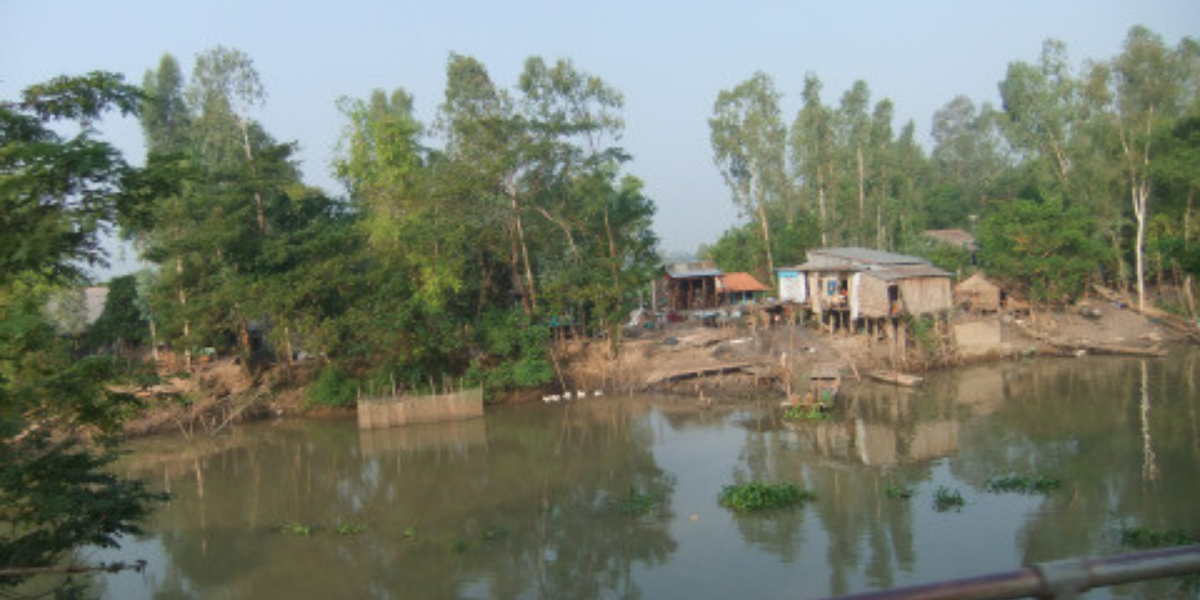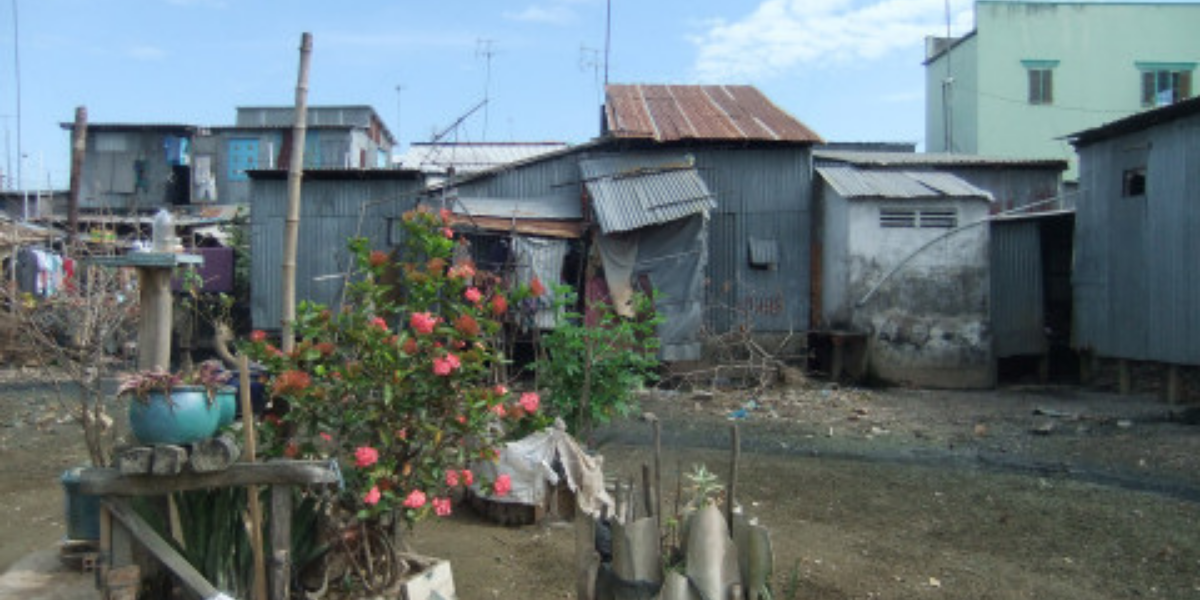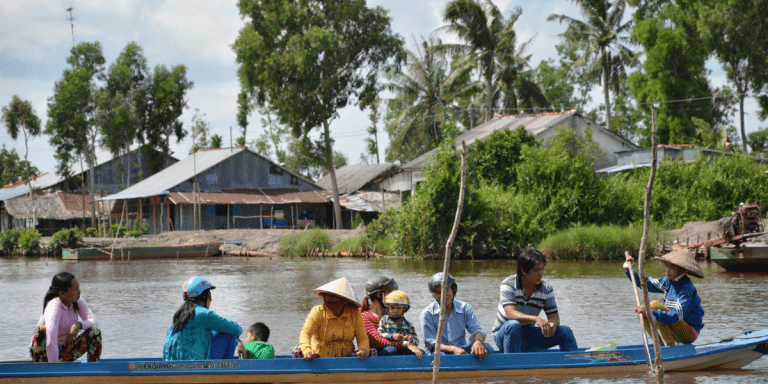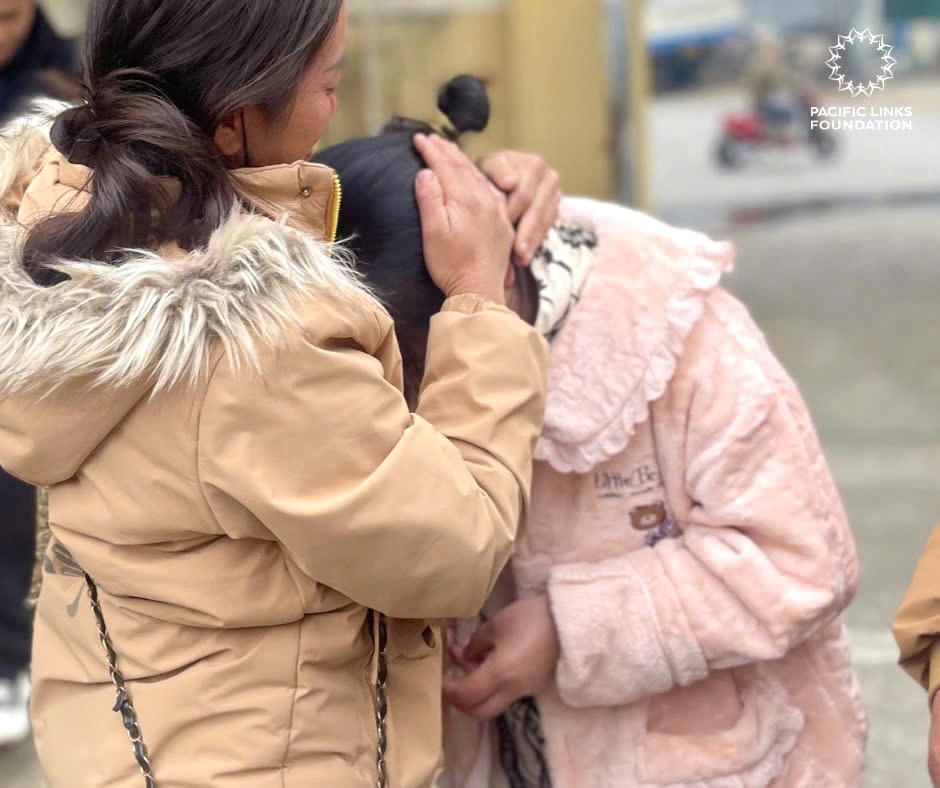As we do every year, today we organized a team of staff members to visit the homes of the students in the scholarship program. This time the whole office went, a total of seven people, three of whom are volunteers, including one volunteer who was a recipient of our program a few years ago and has now come back to lend a hand.

We boarded An Hoa Ferry on four motorbikes, headed in the direction of Dong Thap province. This time, our team was planning to visit Phu Thanh A Middle School, Phu Ninh Middle School, Tam Nong High School, and Hong Ngu High School.
We were greeted at Phu Thanh A middle school by Teacher P. and the students in our scholarship program from this school. We split into groups so that we could follow the students back to their homes to meet their families and document their conditions – as we do every year. Everyone was hustling and smiling, calling to each other, borrowing motorbike helmets, and suggesting which students would return home first and which students would stay behind to wait for the next group. It was with this fervor and excitement that we hopped onto our bikes and hit the road, splitting off into various directions.
I was in the group that went with Teacher P., who has been assigned to help our program on behalf of the school for the past seven years. It is rare to find a teacher who is as enthusiastic as him, and who has such deep knowledge about the students’ circumstances as he does. Many of these students have dropped out of school early because of extremely difficult family situations. It has been tricky, but Teacher P. has worked with our scholarship program to encourage and support the girls to return to school. Today, when I was looking for the homes of the high school students in our program, who are no longer attending this teacher’s school anymore, he was still happy to show me the roads to each of their homes.

When I rode with Teacher P., I was able to learn a lot of information about the students before I got to their homes to talk to their families. Sadly, I also learned that this year, in Phu Thanh district, many families would not be celebrating the Lunar New Year because this area was one of the districts that were hit hardest by the unusually severe 2011 flood season. Many homes had sunk into the ground or had collapsed because the foundational columns sat in standing water for so long and had rotted. For people who worked the farms and fields, all of their crops had been ruined. Everything they’d planted had died and been washed away by floodwaters. Those who made a living from catching fish or picking vegetables had been tied to their homes because of the high floodwaters, and those who were day laborers waited for calls from employers that never came. On the road, I could see evidence of the things Teacher P. was telling me. There were many stretches of the road, deep in the fields, that had been eroded. In many places, the sinkage was extremely deep and the traces of the floodwater’s trails were still visible in the sand.
When we reached the home of L., an eighth-grade student who has lost both parents, her paternal grandmother said worriedly “The floods lasted so long that the foundational columns of the house turned to pulp. When will the house collapse? The debts have piled up because the water took so long to retreat”.
T., who is in the tenth grade, is also an orphan. At her home, I learned that her grandmother used to work as a hired day laborer, planting and cutting rice stalks and picking water spinach from the fields. She told me that she has been taking care of her two granddaughters since they were little girls. Her primary income comes from cleaning up the fields after harvest, gathering the leftover rice stalks, and selling them. Now that the rice fields are almost completely harvested by machines, her labor is unnecessary. In addition, the machines collect the seedling rice stalks more efficiently, so there are no leftover rice seedlings for her to gather, and the woman has lost this important source of income. But T.’s grandmother is someone who takes initiative, and so she found a new trade-in traditional medicine and acupressure. The woman told me that the work was somewhat like volunteerism: anyone with a headache, a runny nose, or sore muscles would call her and she would come to perform acupressure, steam inhalation, and other such traditional remedies for them. Those with money would give her 5,000 – 7,000 VND ($0.25 – $0.30), and for those without money, she would perform the services simply to help them.

In the middle of the day, I visited the homes of two girls who had dropped out of school.
When I arrived at the home of N., a tenth grader who has lost her father and had been an excellent student for many years before she dropped out one month ago, I stopped in surprise before the door of a house that lay in shambles. It was completely different than the warm and rosy picture I had seen on the previous visits. I walked through the narrow doorway lined with weeds into a room speckled with patches of sunlight that were shining through the holes in the walls. The rays of sunlight danced on the small table that had been N.’s study table, where there were still piles of neatly stacked schoolbooks and notebooks with N.’s handwriting. The table looked lonely today, so different from the lively picture I’d seen on previous visits because today I wasn’t greeted by N.’s gentle smile. On a bamboo bed across from me, N.’s maternal grandmother lay staring blankly at the floor. She has some form of severe eczema, and her entire body was covered in peeling patches of white and red skin. N.’s little sister was sitting at the head of the bed, staring at me. It was noon, but the kitchen was cold and the two women, one young and one old, sat silently like stones. N.’s grandmother said that her grandfather had been in the hospital constantly, and the family was in extreme hardship. As the only wage earner, N.’s mother couldn’t make ends meet, and had decided to take N. out of school so that she could become an apprentice at a beautician’s shop in town, to help take care of the grandparents and her little sister. I demanded many times, an angry tone in my voice, “Why did our scholarship program help N. so much, only to have you take her out of school so easily? What happened to the commitment you had to keep your daughter in school through the twelfth grade?”
I stopped by the market, following the tip that N. was studying to be a beautician at “Tien” hair salon. I paced back and forth in the tiny countryside market that had only four or five salons before I discovered a tiny shop at the back of the market with a big “Kim Tuyen” sign. When I got a little closer, it was easy to recognize N. behind the store, shampooing a customer next to another girl. She stood out among the other girls with their thick makeup and red-dyed hair because of her beautiful simplicity. I noticed the strands of her long black hair tied back in a ponytail, and I noticed her two cheeks flushed from working in the afternoon sun. It was so different than the pale expression I’d seen before when Ms. Kieu Nhi, a former Program Director, helped her go to Ho Chi Minh City for a heart operation. I went into the store and asked for a shampoo, pointing to N. and saying that she was the one I wanted to wash my hair.
After that N.’s story became clearer. I found out that she had cried many times in order to arrive at this decision. Her grandparents were sick all the time. Because her home was so far from school, she had to ask a friend to take her by motorbike but had been unable to come up with the gas money. Her mother had worked at a garment factory 7 kilometers from their home for the past five months but hadn’t yet received a penny of salary. She told me she had to go to work in order to help keep her younger sister in school!

Although it’s been seven years since I started working with Pacific Links Foundation, it seems like it was just yesterday. I see these students several times each year, but I’m always surprised at how much they have changed and grown. One day they are little girls in elementary and middle school, but when I turn my eyes away for just a second, I turn back to see that they have become teenagers. From my perspective, the time has flown by, but I wonder whether the time has flown for these girls, who are doing their best to take care of their parents, their grandparents, and their younger siblings, going without basic needs and striving to survive hand to mouth. How many times have they had to come face to face with the natural uncertainties of life? They are just young girls. What secret dreams do they have that they could never dare to utter aloud? Do they feel angry or depressed because their parents aren’t able to take care of them, or thirst for the little things that girls their age in the city have in abundance?
Nguyen Thi Phuong Thao, Translated by Lillian Forsyth



